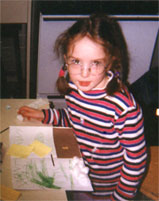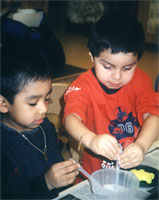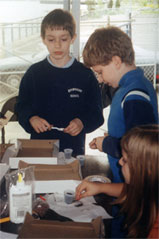| PRE-K |
Water, Water, Everywhere |
Look at the physical properties of water. What floats? What sinks? When is water not a liquid? What's a meniscus? Explore surface tension, solutions and erosion. Count how many drops of water a sponge will absorb and dissolve a capsule to reveal a surprise. |
 |
| GRADES K-1 |
Motion Commotion |
What energy makes the jumping bug jump and that toy boat zip across the water? How can particles dance in a static tube? What keeps a paper towel dry under water? Balance a gravity fighter and make a cellophane fish curl. You'll be really attracted to magnetism. |
| GRADES 2-3 |
Action Attraction |
You're in the power seat. Control your "springer." Turn a full cup of water upside down without a spill. Have you ever used static electricity to separate salt and pepper? Use water power to spin a turbine. Go with the flow of air pressure. |
| GRADES 4-6 |
Earth Power |
Take home samples of volcanic rocks and ash after modeling a volcano and watching it blow. Find your own real microfossils. Move continents on your tectonocycle. Will you help save the earth from strip mining? Or an oil spill? Where's your power? |




